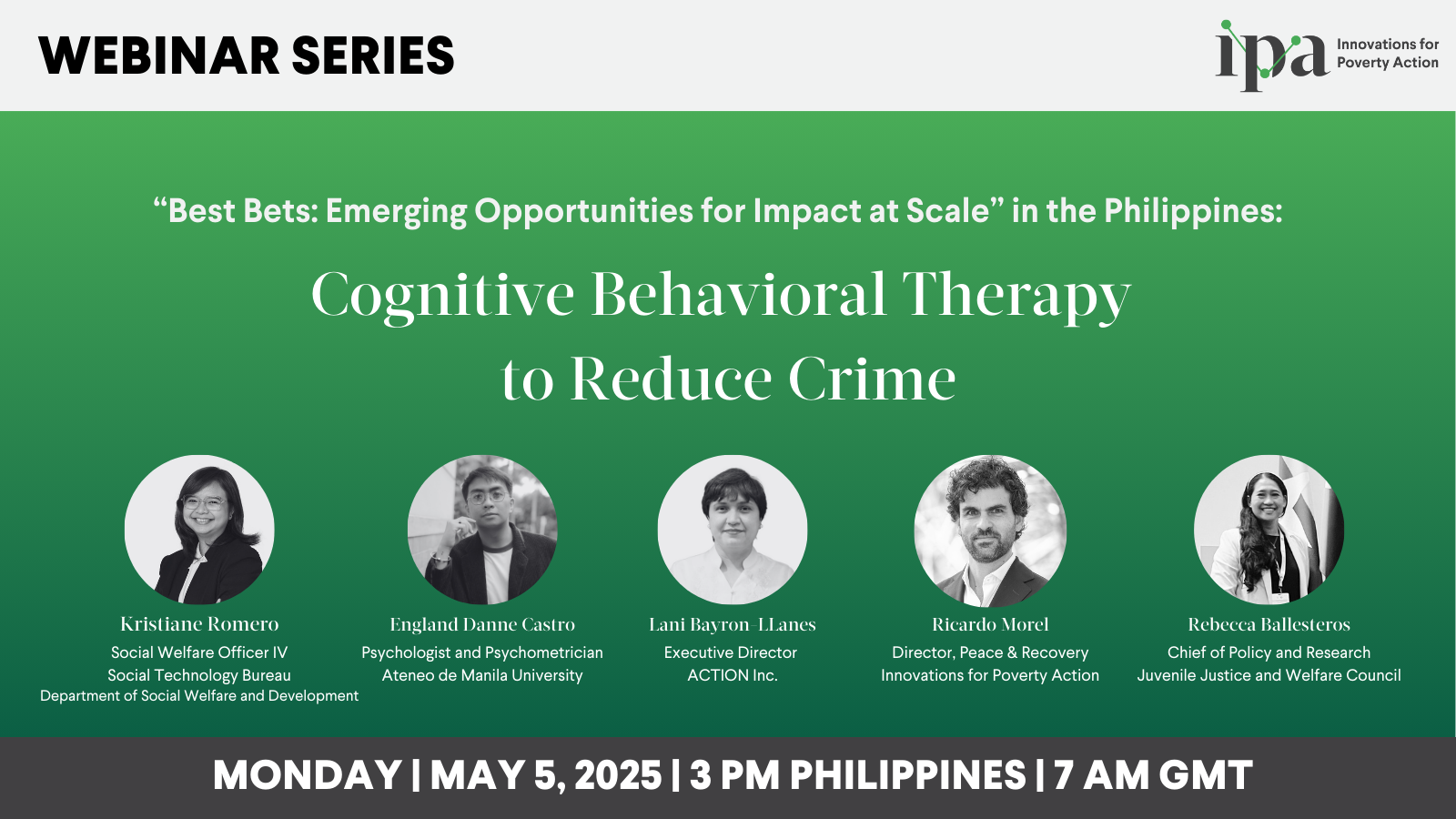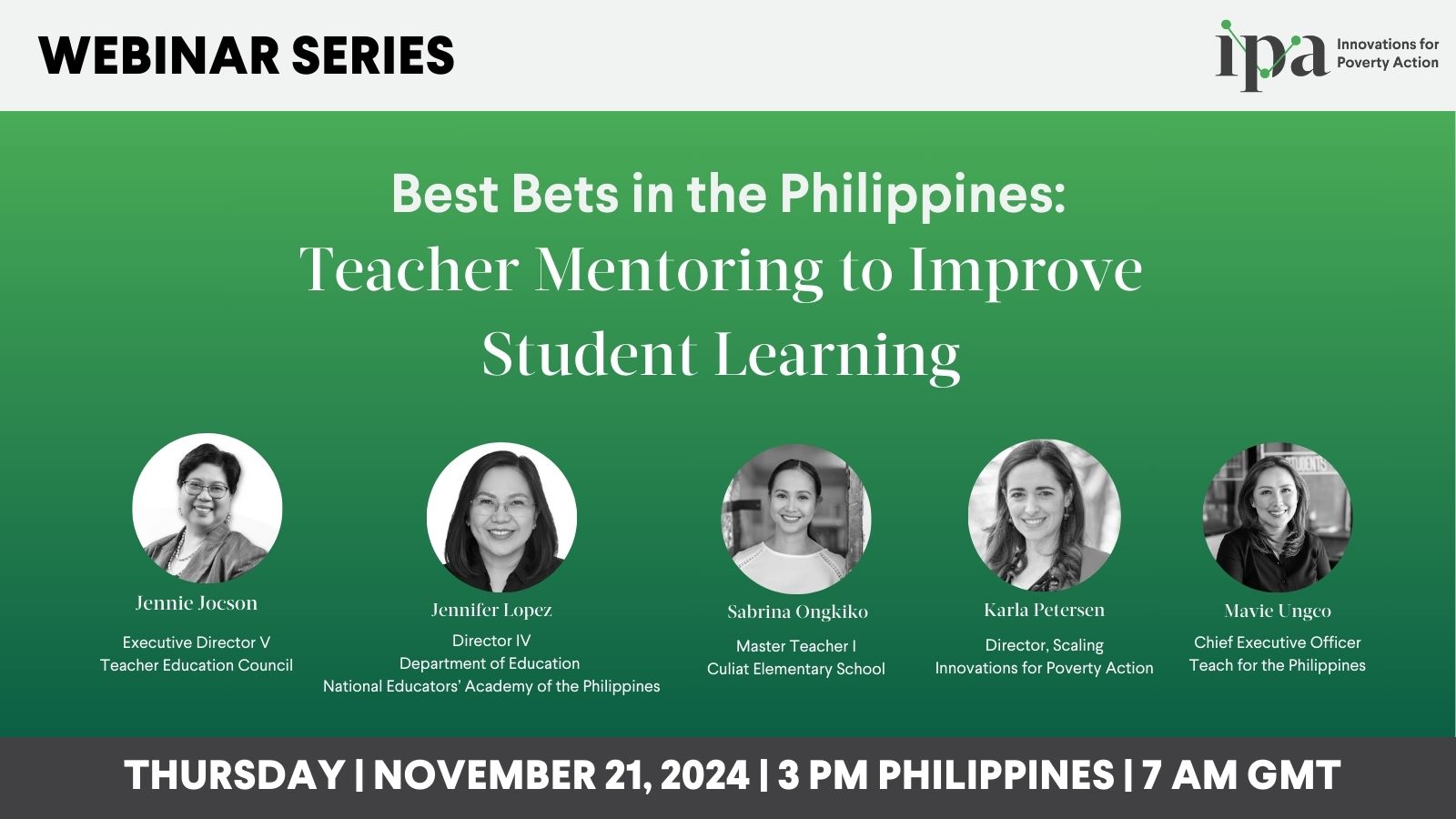Webinar Series | Best Bets in the Philippines
In November 2023, IPA launched the Best Bets: Emerging Opportunities for Impact at Scale report. The report showcases fourteen innovations that IPA’s sector experts and scientific advisors believe hold the most promise for making an impact at scale, but require additional investment to advance along the path to scale.
IPA Philippines has chosen four Best Bets that are highly relevant in the Philippines: (i) teacher mentoring to improve student learning, (ii) digital payments to improve financial health, (iii) payment for ecosystem services to reduce deforestation and protect the environment, and (iv) cognitive behavioral therapy to reduce crime. Through a series of webinars starting, we will dig deeper into each of these Best Bets, explore their applicability in the Philippines together with key players in these respective fields from academia, government, and civil society organizations. The webinar series will provide a platform to explore opportunities for further research and collaboration.
Webinar Series | Best Bets in the Philippines | Webinar #2: Cognitive Behavioral Therapy to Reduce Crime

In 2020, over 15,000 children were arrested in the Philippines for criminal activities, most of them between the ages of 15-18 (PCIJ, 2020). The issue of Children in Conflict with Law (CICL) affects not only the children but also their victims and the wider community, leading to long-term social and economic consequences. As identified in the IPA Best Bets report, Cognitive Behavioral Therapy (CBT), a short-term, pragmatic form of psychotherapy that encourages individuals to alter their thinking patterns and behaviors, has shown strong results in reducing violence and criminality among adolescents and young adults.
To understand CBT’s applicability and relevance in the Philippines, we hosted the second webinar on May 5, 2025 with experts from the Department of Social Welfare and Development (DSWD), Ateneo de Manila University, ACTION Inc., and the Juvenile Justice and Welfare Council (JJWC). Speakers highlighted that CBT is incorporated in DSWD’s Buklod Paglaom para sa CICL, the national program for CICL, with early evidence of improved social behavior and life outcomes. A pilot evaluation in 2018 showed 82% of children had improved emotion management, life skills, and moral reasoning.
The discussion underscored how CBT can be more impactful when paired with complementary approaches like mindfulness, play therapy, and life skills training, especially when tailored to the developmental and emotional needs of children. Implementers also emphasized the need for culturally grounded randomized controlled trials (RCTs) to improve implementation strategies and secure greater buy-in and investment from local governments.
View the webinar slides here and the video recording below:
Webinar Series | Best Bets in the Philippines | Webinar #1: Teacher Mentoring to Improve Student Learning

Despite progress in increasing school enrollment in the Philippines, improving learning outcomes remains a critical issue. A 2023 World Bank report revealed that 9 of ten Filipino children aged ten find it difficult to read and understand a simple age-appropriate text, reflecting challenges posed by ineffective teaching practices. In IPA’s Best Bets report, global evidence has shown that teacher mentoring, in which dedicated educational professionals or “teacher coaches” provide training, advice, and feedback to in-service teachers, is an effective intervention that has the potential to increase student learning.
On November 21, 2024, IPA Philippines hosted the first of its four-part Best Bet Webinar Series, diving into the emerging evidence on teacher coaching to improve student learning outcomes. Participants joined an in-depth discussion on teacher development programs in the Philippines with our panel from the Department of Education, Teach for the Philippines, and Teacher Education Council. IPA Philippines was honored to guide this discussion and join forces to identify concrete collaboration opportunities to build a stronger evidence base for teacher coaching.
View the webinar slides here and the video recording below:












